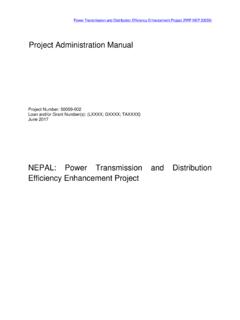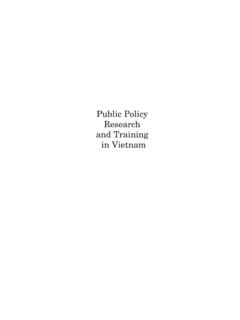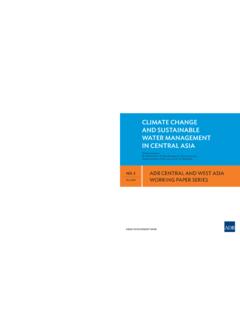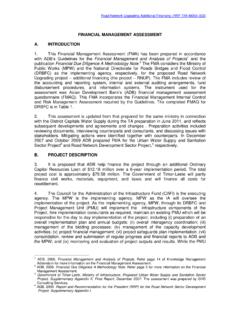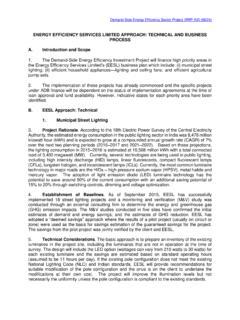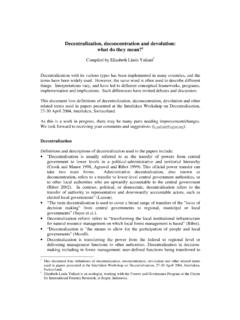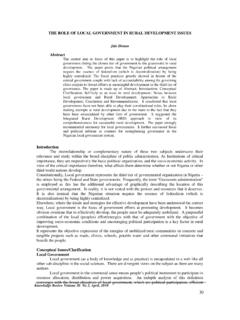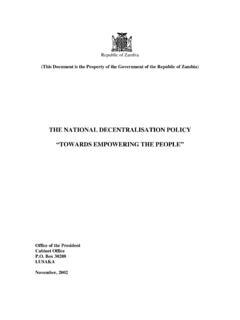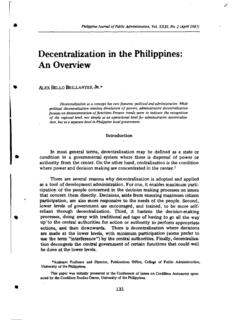Transcription of The Impact of Decentralization: Issues in Theory and ...
1 7KH ,PSDFW RI )LVFDO 'HFHQWUDOL]DWLRQ,VVXHV LQ 7 KHRU\ DQG &KDOOHQJHV LQ 3 UDFWLFH7KH ,PSDFW RI )LVFDO 'HFHQWUDOL]DWLRQ,VVXHV LQ 7 KHRU\ DQG &KDOOHQJHV LQ 3 UDFWLFH7 KLV SXEOLFDWLRQ DQDO\]HV WKH LPSDFW RI ILVFDO GHFHQWUDOL]DWLRQ DQG WKH UHVXOWDQW LVVXHV DQG FKDOOHQJHV WKDW FRXQWULHV IDFH LQ SUDFWLFH ,W WUDFHV WKH HYROXWLRQ RI ILVFDO GHFHQWUDOL]DWLRQ DV D VLJQLILFDQW DQG FRQVHTXHQWLDO JOREDO UHIRUP WKDW KDV PDGH VXEQDWLRQDO JRYHUQPHQWV NH\ SXEOLF VHFWRU DFWRUV LQ D PDMRULW\ RI FRXQWULHV 7 KLV QRWH WRXFKHV XSRQ LWV YDULRXV DVSHFWV LQFLGHQFH DQG SUHVHQFH LQ WKH ZRUOG IRXQGDWLRQ LQ HFRQRPLFV LPSDFW RI D OLVW RI RXWFRPHV LQFOXGLQJ HFRQRPLF JURZWK PDFURHFRQRPLF VWDELOLW\ SRYHUW\ DQG LQFRPH GLVWULEXWLRQ DQG VHUYLFH GHOLYHU\ DQG SROLWLFDO DFFRXQWDELOLW\ ,W FRQILUPV WKH SRVLWLYH RYHUDOO LPSDFW RI GHFHQWUDOL]HG V\VWHPV HVSHFLDOO\ ZKHQ WKH\ DUH ZHOO GHVLJQHG DQG LPSOHPHQWHG ZLWK H[DPSOHV IURP DURXQG WKH ZRUOG LQFOXGLQJ WKRVH IURP $VLD DQG WKH 3 DFLILF $ERXW WKH $VLDQ 'HYHORSPHQW %DQN$'% V YLVLRQ LV DQ $VLD DQG 3 DFLILF UHJLRQ IUHH RI SRYHUW\ ,WV PLVVLRQ LV WR KHOS LWV GHYHORSLQJ PHPEHU FRXQWULHV UHGXFH SRYHUW\ DQG LPSURYH WKH TXDOLW\ RI OLIH RI WKHLU SHRSOH 'HVSLWH WKH UHJLRQ V PDQ\ VXFFHVVHV LW UHPDLQV KRPH WR WZR WKLUGV RI WKH ZRUOG V SRRU ELOOLRQ SHRSOH ZKR OLYH RQ OHVV WKDQ D GD\ ZLWK PLOOLRQ VWUXJJOLQJ RQ OHVV WKDQ D GD\ $'% LV FRPPLWWHG WR UHGXFLQJ SRYHUW\ WKURXJK LQFOXVLYH HFRQRPLF JURZWK HQYLURQPHQWDOO\ VXVWDLQDEOH JURZWK DQG UHJLRQDO LQWHJUDWLRQ %DVHG LQ 0 DQLOD $'% LV RZQHG E\ PHPEHUV LQFOXGLQJ IURP WKH UHJLRQ.
2 WV PDLQ LQVWUXPHQWV IRU KHOSLQJ LWV GHYHORSLQJ PHPEHU FRXQWULHV DUH SROLF\ GLDORJXH ORDQV HTXLW\ LQYHVWPHQWV JXDUDQWHHV JUDQWV DQG WHFKQLFDO DVVLVWDQFH $VLDQ 'HYHORSPHQW %DQN $'% $YHQXH 0 DQGDOX\RQJ &LW\ 0 HWUR 0 DQLOD 3 KLOLSSLQHVZZZ DGE RUJ,6%1 323 73 XEOLFDWLRQ 6 WRFN 1R 537 3 ULQWHG LQ WKH 3 KLOLSSLQHV-RUJH 0 DUWLQH] 9D]TXH]3 ULQWHG RQ UHF\FOHG SDSHU,PSDFW RI )LVFDO 'HFHQWUDOL]DWLRQB&RYHU LQGG 30 The Impact of Fiscal decentralization Issues in Theory and Challenges in PracticeJorge Martinez-Vazquez 2011 Asian Development BankAll rights reserved. Published in the Philippines. ISBN 978-92-9092-323-7 Publication Stock No. RPT113308 Cataloging-In-Publication DataMartinez-Vazquez, Jorge The Impact of fiscal decentralization : Issues in Theory and challenges in City, Philippines: Asian Development Bank, Fiscal decentralization . I. Asian Development views expressed in this publication are those of the authors and do not necessarily reflect the views and policies of the Asian Development Bank (ADB) or its Board of Governors or the governments they represent.
3 ADB does not guarantee the accuracy of the data included in this publication and accepts no responsibility for any consequence of their making any designation of or reference to a particular territory or geographic area, or by using the term country in this document, ADB does not intend to make any judgments as to the legal or other status of any territory or encourages printing or copying information exclusively for personal and noncommercial use with proper ac-knowledgment of ADB. Users are restricted from reselling, redistributing, or creating derivative works for commercial purposes without the express, written consent of :In this report, $ refers to US Development Bank6 ADB Avenue, Mandaluyong City1550 Metro Manila, PhilippinesTel +63 2 632 4444 Fax +63 2 636 orders, please contact: Department of External RelationsFax +63 2 636 on recycled ivIntroduction 1 The Causes and Basic Theory of decentralization 2 Evidence of the Impact of Fiscal decentralization on Economic and Fiscal Variables 4 Evidence of the Impact of Fiscal decentralization on Governance 7 Evidence of the Impact of Fiscal decentralization on Political Outcomes10 Conclusion 11 References 12ivAcknowledgmentsThis Policy Note transcribes the main content of the presentation that Professor Jorge Martinez-Vazquez, Andrew Young School of Policy Studies, Georgia State University delivered at the Asian Development Bank headquarters in Manila on 7 October 2010, at the invitation of the Governance and Public Management Community of Practice.
4 The work was completed under the overall strategic direction of Sandra Nicoll, director, Public Management, Governance and Participation Division of the Regional and Sustainable Development Department, and Bruno Carrasco, director, Public Management, Financial Sector and Trade Division of South Asia Department. Tariq H. Niazi, principal public management specialist, provided substantial inputs and technical editing of the the last several decades, a revolution has been occurring in many countries around the globe, with the devolution of fiscal and political powers to subnational governments. This trend could be as influential for good governance and for improving the lives of ordinary citizens as major institutional transformations of the past century, such as decolonization in Africa and Asia or the transition from planned to market economies in the former Soviet Union and the People s Republic of China (PRC).
5 Due to decentralization , many subnational governments have become key public sector actors. As such, their roles have grown, and expectations placed on them have increased. As countries continue to abandon centralized governance, it becomes increasingly important to know the Impact of decentralization on a number of economic Issues including growth and development; reducing poverty and achieving the Millennium Development Goals; advancing public services, such as education and health; and achieving greater macroeconomic stability with lower unemployment and inflation. The fundamental question is whether the ongoing decentralization trend is helping or hurting with these Issues . The Impact of devolution on a gamut of fundamental institutional Issues , such as country unity versus separatism as well as the level of corruption, should also be scrutinized.
6 This policy note explores (i) why countries choose to decentralize their governance; (ii) what economic Theory expects from decentralization ; and (iii) what is known about the Impact of decentralization on a relevant list of economic and political variables, as well as what conclusions are Causes and Basic Theory of DecentralizationCountries begin decentralization processes for different reasons. Some are searching for a more efficient and leaner public sector, while others are disenchanted with the performance of planning and centralized policies ( , socialist economies). There are often grassroots demands to achieve democratic ideals. On the other hand, some movements are designed to contain or to appease centrifugal forces, ethnic conflicts, and/or separatism, and to diffuse social and political tensions by allowing local cultural and political autonomy.
7 There may even be some political opportunism using decentralization for electoral objectives and/or just a desire to not be left behind in this popular form of institutional reform. While governments do not generally decentralize to pursue greater macro stability and economic growth, decentralization may Impact upon these. decentralization generally means the devolution of decision-making powers. A related concept is deconcentration , in which operations are decentralized, but decision-making powers are not devolved. For example, many observers state that Bangladesh is a deconcentrated system, in which local governments are still subject to the control of central authorities, as opposed to a decentralized one, in which local governments have autonomy to set their own priorities and decide how best deliver public services.
8 In addition, decentralization does not necessarily denote an erosion of central control nor of powers over Issues and processes with national , it has political, administrative, and fiscal dimensions that are replicated more or less completely in different vertical spheres ( , regional and local).2In recent years, there have been multiple extensions of the traditional Theory of fiscal federalism (or the organization of intergovernmental fiscal relations) first developed by Oates in 1972. Viewing government as a benevolent agent, he created a decentralization theorem, which states that in the presence of diverse preferences and needs, provision of services from a decentralized government will lead to increased citizen welfare. This occurs because decentralized government leads to information advantages and more flexibility in adapting to citizens needs and preferences, as emphasized earlier by Hayek (1945).
9 Today, the growing second-generation literature is based on the Theory of public choice, assuming a political economy with selfish officials, as opposed to the benevolent agents in the previous literature. A branch of this literature, known as market-preserving federalism, focuses on incentives for government officials not to deviate from good behavior and emphasizes the role of decentralization as a mechanism to control an intrusive, expansive public sector and to support effective private markets (Weingast 1995, McKinnon 1997).Classical federalism and the Tiebout hypothesis (addressing the competition among local governments and the mobility of individuals to find their preferred package of services) play major 1 For example, until very recently in the Lao People s Democratic Republic, the central government lacked control over tax administration and customs and budget execution, making genuine decentralization impossible since the central government was too For example, India is a very decentralized system at the federal state level, but not at the state local Causes and Basic Theory of decentralization 3 roles in the Theory of local public Unlike the case of pure Samuelson goods (in which the addition of individuals does not diminish the amount available to others and no one can be excluded from its consumption), the efficient decentralized provision of local goods (with crowding in consumption and some excludability)
10 Is possible via the mechanism of mobility of households ( , voting with their feet that is, moving and sorting into homogenous communities). This concept is important to the understanding of decentralization in the United States ( , increased efficiency in the public sector), but it is not necessary to justify the advantage of fiscal decentralization in delivering more efficient outcomes in the delivery of public services. In fact, household mobility across local jurisdictions, like in the United States, hardly exists classical principles for decentralization design are well traveled across countries and over time. Hundreds of decentralization programs proposed by the Asian Development Bank, the International Monetary Fund, the World Bank, bilateral donors, and policy advisors have been inspired by these principles.
